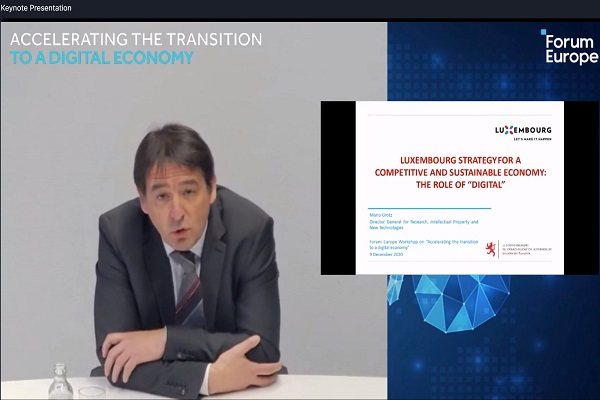 Mario Grotz;
Mario Grotz;
On Wednesday morning, Mario Grotz from Luxembourg's Ministry of the Economy presented the Grand Duchy's digital strategy during Forum Europe's webinar on "Accelerating the Transition to a Digital Economy".
Mario Grotz, Member of the Steering Board at the European Space Resources Innovation Centre (ESRIC) Luxembourg and President of Luxinnovation, was among the first keynote speakers at this high-level interactive workshop, organised by Forum Europe with the support of Arthur D Little and Huawei.
In his presentation, entitled “Luxembourg Strategy for a Competitive and Sustainable Economy: the Role of Digital”, Mr Grotz highlighted that Luxembourg was well-positioned as a strategic European hub, not only for finance but also for the space and logistics sectors. He described the Grand Duchy as "the backbone of the digital pole of the EU", as the host of many EU digital services. The latest example is the European High Performance Computing Joint Undertaking (EuroHPC JU), which started its activities in Luxembourg in November 2018 and is operational until 2026. He stressed that Luxembourg is "willing to stay at the forefront of technology", with the government having invested heavily in what has become a "top-notch" ICT sector today.
In the second part of his presentation, Mario Grotz presented the Luxembourg government's current vision and strategy for the digital economy. He maintained that the main challenge was to combine existing technologies (artificial intelligence, Intenet of Things, etc.) with new technologies (such as the HPC) to ensure future growth. He described the government's multispecialisation strategy, which focusses on small sub-areas of specific sectors, such as Industry 4.0 and Fintech, adding that ICT was considered a transversal competence needed to develop the different sectorial priorities of the government rather than merely a sector.
One of the main priorities of this strategy would be to encourage and help Luxembourg companies to experiment with and use technology in an efficient way in the future, as well as implementing a strong regulatory framework.
Mario Grotz explained that Luxembourg's ambiton was to become one of the first EU Member States to "align and translate the twin EU goals of climate neutrality by 2050 and global leadership of the digital revolution" and manage to integrate these twin goals into "one single transformative national strategy". He added that it was important to build on existing strengths to tackle potential environmental or societal challenges.
Going into more detail into the government strategy set to be adopted in January 2021, Mr Grotz presented six "building blocks". These are divided into three vertical and three transversal building blocks. The former consists of: accelerating the digital economy for societal benefit; driving the digitally enabled circular economy transition; and developing resilient strategic value chains (for Luxembourg and the Greater Region). The remaining three building blocks are: enabling a secure and trusted-data-economy transformation; ensuring a sustainable digital transition (i.e. developing digital solutions for energy efficiency in industry); and providing a supportive investment environment (i.e. reshaping traditional financial instruments for investment in innovation).
In summary, Mario Grotz reiterated the following three main area's of the Luxembourg government's digital strategy: consolidating Luxembourg's position as a frontrunner in the digital transformation in Eurupe; leveraging the enabling power of "digital" to position Luxembourg as a future European leader in the sustainable green transition; and maintaining and developing strategic partnerships and collaboration within Europe.
In the Q&A part of this session, Mario Grotz responded to a question on the advantages and disadvantages of Luxembourg's size. He explained that, on the one hand, the Grand Duchy is "very flexible and agile" and the decision-making process is often "more straightforward" than in larger countries. On the other hand, being a very small county means that Luxembourg sometimes "lacks critical mass" to implement policy, hence the need for European partnerships.








